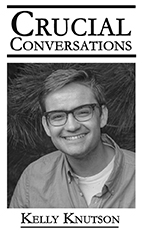 As a whole, we are stuck in our ways. Numerous factors attribute toward our refined direction of viewing affairs, ways of living life as well as ultimately achieving success and happiness. Change, however, sheds light and allows often unconsidered voices to be heard. It is a splash of color in a black and white world. Our voices can blossom the symphonies of change and tear down current norms in order to set free our sometimes controlled puppeteer mentalities. What change needs to occur at Concordia, locally and globally? How are you called to action?
As a whole, we are stuck in our ways. Numerous factors attribute toward our refined direction of viewing affairs, ways of living life as well as ultimately achieving success and happiness. Change, however, sheds light and allows often unconsidered voices to be heard. It is a splash of color in a black and white world. Our voices can blossom the symphonies of change and tear down current norms in order to set free our sometimes controlled puppeteer mentalities. What change needs to occur at Concordia, locally and globally? How are you called to action?
Remember, action or change is not a bad thing. It allows us to be vulnerable, reflect and move forward; not retract. The challenge is asking what will benefit everyone. Not just the majority or select few. But, how do we make this happen? Is beneficial change even feasible for everyone? My often radical ideology believes there can be.
Most of us have become comfortable in the life we live. To some extent, this is concerning. Stuck and unwilling to change, we value our own well-being instead of the well-being of those around us. Why? Maybe we are unaware, choose to not care or fear potential outcomes. However, we should not fear the unknown nor approach it naively. We are optimistic about ourselves, but what about the individual sitting across from us, the person halfway around the world or other organisms we may not even know about?
It’s assumed that change leads to stress and is often perceived to have negative connotation to our health, well-being, success etc. While this may have some truth, stress can be helpful when building relationships with others and reflecting upon one’s life, actions, future etc. Instead of negating stress, use it as a motivator, and view it as a positive challenge. Yes, bumps will occur along the way.
The path forward may not always be smooth. Do not, however, avoid change. Instead of jumping to conclusions, keep an open mind and a sense of trust with others as well as in your own ability to handle the challenges life brings you. How resilient is our society, Concordia’s community or even, how resilient are you? Chances are, we are a lot more resilient than we tend to tell ourselves.
It takes time, however, to make change. Decisions and actions cannot be made simply overnight nor should they take an eternity to implement. For each decision, the time is determined by case. Often, change is an uphill battle as trade-offs can always occur.
Is there a proper way to approach change? Top-down or bottom-up? I would argue that a sense of urgency is important, yet this may prohibit our overall sense of understanding toward all affected parties. We should not make assumptions nor should we be misinformed. Create a dialogue that allows multiple perspectives to be given and heard. These conversations, as well as final decisions of change, shouldn’t be limited to the “privileged” few. Everyone should have the chance to have his or her voice heard and be apart of the greater advance toward change.
If you haven’t already heard, administration has been discussing changing the academic calendar to a 1:3:3:1 approach. This allows students to study a single four-credit course for one month intensely, while allowing a three-month period to study their other registered credits. Note classes may be longer due to required seat time, but this approach gives Concordia a unique calendar compared to other schools. Although this calendar change won’t be implemented until the fall of 2015, a decision will be decided by the end of spring semester. As students, we deserve to be a part of this dialogue.
After all, you could be impacted by this change if you are currently a sophomore or freshman. What is your stance? How will this benefit student learning? Should we welcome this new challenge of change? Only time will tell. Remember to listen to everyone’s perspectives and be open to accepting change.

